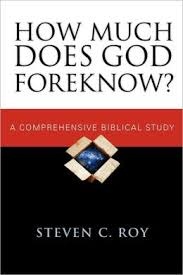“Prior” to the creation of the material universe ex nihilo there was no space or time. Because there was no time we conclude that God existed atemporally (timelessly). What about the absence of space? Would this not mean God existed non-spatially without creation? Yes it would. How does that conclusion square with the Biblical teaching that God is omnipresent? How can a being that is spaceless in nature be omnipresent? Is the Bible contradicting itself in its description of God’s nature? What exactly is the nature of God’s omnipresence? Has He always been omnipresent? These questions ought to cause us to think more clearly about what it means to say God is “omnipresent.”
To be all-present requires that there be a “here” and a “there” to be present at. Without the existence of spatial location the notion of omnipresence is meaningless. Seeing that there was no space “prior” to creation it follows that God was not omnipresent prior to creation. Omnipresence, then, is not an essential attribute of God’s nature; spacelessness is essential to God’s nature. “God existing alone without creation is spaceless.” God became omnipresent concurrent with creation in virtue of the creation of space. Omnipresence emerged as a contingent relation between God and the spatial universe.
What is the Nature of God’s Omnipresence?
While we have determined that God is spaceless without creation and omnipresent subsequent to creation, this does not tell us anything about the nature of His omnipresence. What does it mean to say God is omnipresent? Does it mean He is spatially located within and extended throughout the universe such that He is present at every point, or does it mean He is cognizant of and causally active at every point in the universe though He is neither spatially located in, nor spatially extended throughout it? While we have typically conceived of omnipresence in the first sense I would argue that God’s omnipresence is more aptly described by the second.
At a minimum God’s omnipresence means He is not localized anywhere within space, and that He lacks both shape and size. But if omnipresence refers to God’s extension through space He would have both shape and size because the universe has both shape and size. God is not extended through space so that He fills it like air fills a container. God is not a physical substance that can fill anything. God’s omnipresence in the universe is more comparable to the way in which our minds are “filled” with thoughts. Our thoughts are not spatially extended throughout our minds, and neither is God spatially extended throughout the universe.
If God were spatially present at every point in the universe He could not distinguish “here” from “there.” For a being that is spatially present at every point in the universe everywhere is here; everything is ever-present before Him. There is no “there” for such a being. If God were spatially extended through space He must believe that two points, separated by millions of light years, are both “here.” That would mean God could not know the Statue of Liberty is separated from the Eiffel Tower by thousands of miles. That is patently absurd, and impugns God’s omniscience! There must be a better way of understanding God’s omnipresence.
Has God Changed?
Earlier I argued that spacelessness, rather than omnipresence, is essential to God’s nature. Those properties that are essential to a substance cannot be changed without causing the substance to cease to exist. Only accidental properties can be changed if the substance is to retain its essence. If spacelessness is essential to God’s nature, then, how could God become omnipresent at creation without giving up the property of spacelessness and ceasing to be who He was? If God’s omnipresence is understood as a spatial location extended through space this is unavoidable, for He would be required to relinquish the property of spacelessness in order to assume the property of spatiality, and thus He would cease to exist as the divine essence He once was. If, however, God’s omnipresence is understood as God’s immediate mental cognizance of, and causal activity at every point in the universe then God’s omnipresence would not encroach on His essential spaceless nature. Mental cognizance and causal activity do not require spatial presence.
Additionally, there is nothing intrinsic to the act of creation that would require God to be drawn into space (spatialized). Creation was not a spatial act, therefore, we have no compelling reason to believe God surrendered His divine spacelessness and began to exist spatially subsequent to the act of creation. It stands to reason that God remained spaceless even subsequent to creation. If God remained spaceless His omnipresence must mean He is simply “cognizant of and causally active at every point of space”.
Conclusion
God’s omnipresence is an example of analogous language in which those incomprehensible aspects of God’s nature are described in terms finite humans can comprehend. We run into problems, however, when we take this use of language and apply it to God in literal terms. God is not spatially extended throughout the finite universe, but is cognizant of and causally active in each and every part of it as a non-spatial being. Because God is mentally cognizant of, rather than personally located at every point in the universe He can be both here and there, and know the difference between the two.
<!–[if !supportFootnotes]–>
<!–[endif]–>
 Many Eastern religions make this claim about God. And now, it is being picked up as a popular idea among Westerners. Unfortunately, it is incoherent.
Many Eastern religions make this claim about God. And now, it is being picked up as a popular idea among Westerners. Unfortunately, it is incoherent. Many people, both Christian and non-Christian alike, define God in terms of just one attribute – love – to the neglect of all other attributes. And even then, they misunderstand love to mean unqualified acceptance and approval of our behaviors rather than God’s unqualified desire for our good as a person. As a result of this misunderstanding of God’s nature and His love, people question the existence of hell, the legitimacy of moral judgments, etc. Yes, God is love, but He is so much more. He is also just and holy.
Many people, both Christian and non-Christian alike, define God in terms of just one attribute – love – to the neglect of all other attributes. And even then, they misunderstand love to mean unqualified acceptance and approval of our behaviors rather than God’s unqualified desire for our good as a person. As a result of this misunderstanding of God’s nature and His love, people question the existence of hell, the legitimacy of moral judgments, etc. Yes, God is love, but He is so much more. He is also just and holy. In the
In the  While there are a number of arguments for the existence of a divine being, none of them require that there be only one divine being. Why should we think there is only one God, then?
While there are a number of arguments for the existence of a divine being, none of them require that there be only one divine being. Why should we think there is only one God, then?




